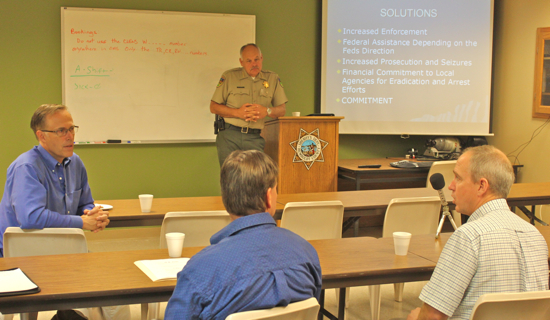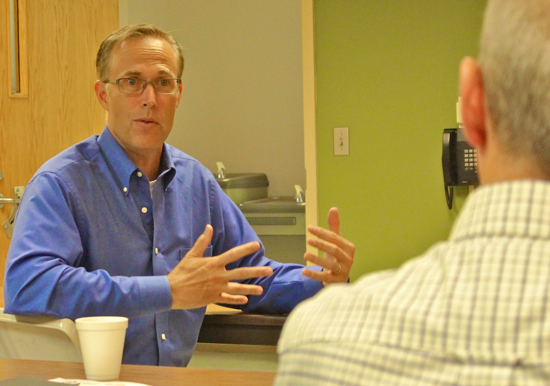
This morning Sheriff Mike Downey is briefing Rep. Jared Huffman on this year’s marijuana season, eradication efforts and the environmental impacts of large-scale cultivation in Humboldt County. Many reporters are in the house, including a camera crew from Dan Rather’s new show. Several wildlife biologists are here.
We’ll be live-blogging this thing. Stay tuned.
###
9:08 a.m.: Downey kicking things off with some slides. He shows a bust from Murder Mountain earlier this year that included recent, unpermitted grading. Further shots of d-CON rodenticide packages found at grow sites. One sheriff’s office official has been trolling Google Earth for growing operations — over 4,100 found so far, each marked with a pushpin.
9:10 a.m.: Talk of the famous dead fisher the Sheriff’s Office found at a recent bust, and of the necropsy performed on it recently. The animal had been dead only for a few hours when the sheriff’s office found it.
9:12 a.m.: Solutions?
“If we’re going to increase enforcement on a nationwide level, we have to do that,” Downey says. “We have to have some kind of national referendum about what we’re going to do about this issue.” Are we going to legalize? “If not, we have to increase enforcement.”
If we don’t legalize, we need more arrests, more forfeitures.
9:14 a.m.: Huffman says he’s been attempting to get Humboldt Conty included in a “high-intensity drug trafficking program.” He’s also been sponsoring legislation that will address serious environmental impacts associated with trespass grows.
“We need to throw the book at them,” Huffman says.
9:15 a.m.: “The proof we have with the fisher is really significant,” Huffman says. “I think this is something we need to take very, very seriously.”
Downey just mentioned that he is getting a lot of support for cracking down on big, nasty grows — including from local growers.
9:17 a.m.: Mourad Gabriel of U.C. Davis, who has been studying the environmental impacts of the industry, specifically on the fisher. He says that he’s having difficulty finding resources to continue his work. He and others need some law enforcement support to get to sites and explore them properly.
9:20 a.m.: Downey and Gabriel talk bioaccumulation of the worst, nasty rodenticides. “At one point it’s going to transfer into game species — deer, bear or wild boar,” Gabriel says. A sheriff’s deputy says that they’re finding poisons at almost every spot they bust on public lands.
9:22 a.m.: A forest manager for Humboldt Redwoods says they’ve pulled 14,000 plants off their Humboldt and Mendocino County holdings this year. “We have to do something about these people that are on our properties,” he says. “It’s dangerous for our workers.”
“It’s not your idiot brother out here growing pot,” he says. “It’s dangerous people.”
9:24 a.m.: A US Forest Service manager: “The good thing about public land is you see the number of plants dropping down since 2009.” A lot of reasons, he says, but specifically because Forest Service policy is now to entirely remove all infrastructure each time they find a grow.
9:26 a.m.: A California Fish and Wildlife official says that their main concern at the moment is private lands. They get many, many calls about streams being dewatered. “It’s a significant issue — just as big as public land grows, if not bigger.” Huffman agrees — the impacts of stream diversion is a very big issue.
9:34 a.m.: “We’re in the worst of all worlds in California,” says Huffman, responding to some discussion about the economic pressures that are prompting growers more and more. He says the trap between state and federal law leaves local law enforcement in a regulatory nightmare. Huffman reiterates his support for national decriminalization efforts to bring some sense to the law.
9:36 a.m.: Lt. Steve Knight of the Sherrif’s Office: “It’s all about greed.” People are coming into town from all over the country, all over the world, to blow up scenes. Backwoods land continues to sell like hotcakes. “It’s lie the Gold Rush.”
Downey says 78 percent of the county’s homicides are related to drug commerce.
9:40 a.m.: Gabriel asks Huffman what he’s going to do to get more resources to help combat the problem — to dismantle backwoods infrastructure, to fund law enforcement. Huffman says he will do his best, but tells Gabriel not to hold his breath — Washington isn’t giving away money these days. The U.S. Forest Service’s firefighting budget for this year was just depleted. “We have to work on the broader policy front, because that’s what driving this,” Huffman says.
Downey: “I was never a big fan of legalization, but right now I think that’s the most logical way to end this drug war.”
9:45 a.m.: This is wrapping up. Downey says that they’re going up in the helicopter with Huffman and Dan Rather shortly. He’s hoping to show the Congressman the scope of the damage.
Our Humboldt County, Downey says, is “being destroyed right before our very eyes.” Perhaps federal attention will help.
9:46 a.m.: “You’re now talking about dozens of members of Congress who support changing policy,” Huffman says. He says that some interesting coalitions supporting legalization are now forming, including Tea Party Republicans who don’t like the federal government being involved in the state’s business. “They’re arriving at it from a different direction than I am,” Huffman says, but they’re arriving at the same place.
This is the best solution, Huffman says: “If you create a legal channel for this, why would anybody trespass and live in squalor on public lands?”

(Photos by Andrew Goff.)
CLICK TO MANAGE